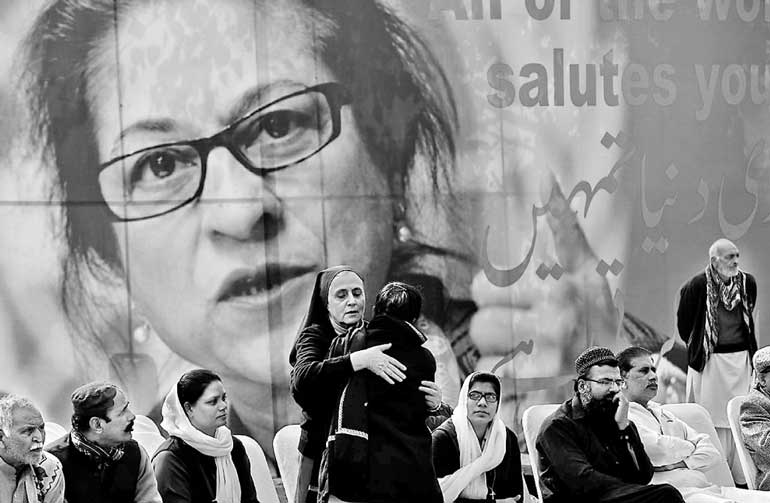Wednesday Feb 18, 2026
Wednesday Feb 18, 2026
Saturday, 17 February 2018 00:00 - - {{hitsCtrl.values.hits}}

When Asma Jahangir, the Pakistani human rights campaigner who single handedly took on the civil, military, and religious establishment in her country, died in Lahore on 11 February, she had spent 48 of her 66 years in the war against injustice.
But her concern was not just for the deprived in Pakistan alone. It extended to several countries including Iran and neighboring India.
She believed that Pakistan and India are chips off the old block facing the same problems and attempting to solve them in the same undesirable ways which have widened existing rifts instead of reducing them. She told this writer: “Looking at the way India and Pakistan are quarreling, they seem to be the biggest jokers in the world.”
Despite the ever present threat posed by the military establishment to democracy in Pakistan, Asma felt that democracy would bounce back.
“Democracy has made gains and even military dictators had to bow out because they had lost public support. If democracy has been slow to take root in Pakistan it is because it has not been given a fair chance,” she argued.
Asma’s career in justice began when she was just 18. She filed a case to get her politician father Malik Ghulam Jilani released from prison in a politically motivated case. Jilani had been arbitrarily detained by the military government of Gen. Yahya Khan .The case led to a historic Supreme Court judgment.
It wasn’t long before she and her sister Hina Jilani established Pakistan’s first all-women legal firm in Lahore. Their clients included Christians facing death sentences on blasphemy charges, bonded labourers who had fled the iron grip of feudal landlords, and women who faced violence at home.
Asma was a rebel in Islamic Pakistan even in her personal habits. She smoked openly, daring the men to object. At her funeral at the Gaddafi Stadium, women participated, and that too in very large numbers even ousting men from the front rows to be near the body of their icon. Even in her death, Asma was subverting the establishment key elements of which are in the grip of Wahabists.
When the hard as nails Gen. Zia-ul-Haq was ruling the roost in Pakistan in the 1980s, Asma dared to form the Women’s Action Forum (WAF), which confronted the military dictator on the “Hudood Ordinance” which prescribed punishments as per the Sharia. She argued that the ordinance discriminated against women.
Mother of Pakistan’s Human Rights Movement
In 1983, Asma and other WAF protestors faced fierce violence at the hands of the police and were arrested. As the mother of the human rights movement in Pakistan, Asma was one of the founders of the Human Rights Commission of Pakistan, a fiercely independent NGO she headed for several years. She opposed tooth and nail, Pakistan’s infamous Blasphemy Law which can be easily misused to finish off individuals who are non-Muslims. The sentence for blasphemy – a very loosely defined series of acts – is death.
In 1995, even in the face of violent threats from Islamic vigilante mobs, Asma and her sister Hina Jilani successfully defended two Christian teenagers, Salamat Masih and Rehmat Masih, in their appeals against death sentences for blasphemy. Her car was smashed by an angry mob baying for the blood of the two boys. As her detractors were targeting her two daughters, Asma sent them abroad to continue their schooling.
“Sometimes you have to pay an unbearable price for what you believe in,” she told Amnesty International.
In 1999, a gunman shot dead Samia Imran, a victim of domestic abuse, when the lady was in Asma’s office drafting a divorce petition with the help of Asma’s sister Hina. One of the bullets narrowly missed Hina.
Undeterred by violence against her, Asma “confronted injustice wherever she saw it,” to quote Amnesty International Secretary General Salil Shetty. She would champion the cause of women, children, bonded labourers, religious minorities, journalists, and the disappeared.
In 2007, Asma Jahangir was placed under house arrest by then President Gen. Pervez Musharraf when he imposed a State of Emergency, suspending the constitution and arbitrarily detaining hundreds of people, including judges, opposition politicians, and human rights defenders.
Asma had been UN Special Rapporteur three times – on extrajudicial, summary or arbitrary executions; on freedom of religion or belief, and, most recently, on Iran.
Her 2008 report on religious freedom in India as UN Special Rapporteur on Freedom of Religion or Belief was both truthful and fair as she believed that no human rights issue can be addressed in a biased and one-sided way. She had no agenda other than the protection of the rights of all, including the State – the legitimate authority.
Fight against religious discrimination
Asma pointed out the injustices perpetrated by the anti-conversion law in several Indian States in her report on freedom of religious belief in India written in 2008. The law made change of religion a public matter and not a matter of personal choice. It eroded individual freedom severely. The anti-conversion laws carry penalties of imprisonment and fines with harsher penalties in the case children, women or persons belonging to the scheduled castes or scheduled tribes.
Furthermore, in some states, anyone converting another person from one religion to another is required to obtain prior permission from state authorities thirty days before the date of the intended conversion. In other states with such laws, anyone intending to change his or her religion needs to give prior notice or intimation after the conversion ceremony.
Asma reported attacks on religious minorities and their places of worship as well as of discrimination against the disempowered sections of the Hindu community.
Widespread violence in the Kandhamal district of Orissa in December, 2007 primarily targeted Christians in Dalit and tribal communities. By the end of September, 2008, more than 40 people had allegedly been killed in Orissa, over 4,000 Christian homes destroyed and around 50 churches demolished. Around 20,000 people were living in relief camps and more than 40,000 people hiding in forests and others places.
 Reporting on counter-terrorism measures
Reporting on counter-terrorism measures
Following the riots in Godhra in 2002, many Muslim interlocutors informed Asma that a number of them had been arrested on ill-founded suspicion of terrorism. Some of them even encountered problems in finding a lawyer who would be prepared to defend a terrorist suspect.
However, many Muslims were disturbed that terrorism was associated with their religion despite various public statements from Muslim leadership denouncing terrorism.
A large number of her interlocutors, including Muslims, also expressed their concern about continued radicalisation and cross-border terrorism. They lamented that the radicalisation of certain Muslims had an adverse impact on the entire community because communal relations hardened after every act of terrorism carried out by a militant group of Muslims.
Asma reported on the counter-terrorism measures adopted by the Government that undermined the enjoyment of human rights in Kashmir. But in all this, Asma did not ignore the plight of the Kashmiri Pundits (Hindus) who had to flee Kashmir in thousands to escape from Pakistan-inspired Muslim militants.
With regard to the social, economic and educational status of the Dalits who had converted to Christianity and Islam she noted that converts were ineligible for State benefits and welfare programs meant for Dalits.
In 2008, an independent research study commissioned by the National Commission for Minorities found that there was a strong case for offering Muslims and Christians of Dalit origin the same constitutional safeguards already available to Hindu, Sikh and Buddhist Dalits.
Many of the Special Rapporteur’s interlocutors referred to the anti-Sikh riots after the attack by the Indian army on the Golden Temple in Amritsar (“Operation Blue Star”) in June 1984 and subsequent to the tragic assassination of Ms. Indira Gandhi on 31 October 1984. During the following four days, nearly 3,000 Sikhs were reported to have been killed.
Two commissions and eight committees were set up from 1984 to 2005 in order to identify those responsible for the anti-Sikh riots. But many families of the victims or survivors said that the main accused had gone scot free.
Asma referred to the sorry state of the Muslims in comparison with the Hindus in terms of employment and education but she also noted that the government, especially at the Center, had put in place institutions to look after the welfare of the Muslims and other minorities, including a separate ministry for them. Several commissions had reported on the inadequacies faced by the Muslims and suggested remedial measures.